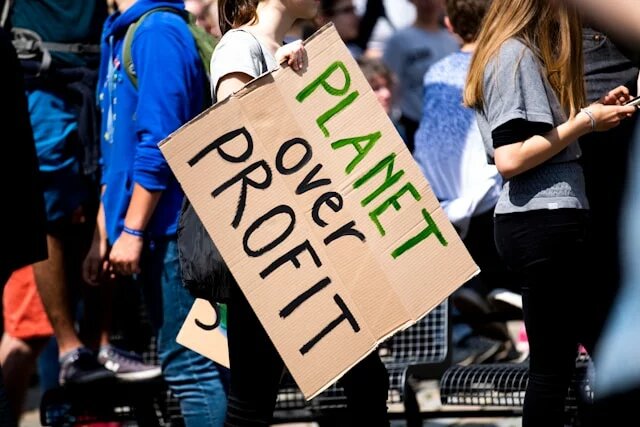As Armenia grapples with the political, environmental, and ethical dimensions of COP29, set to take place in neighboring Azerbaijan, the nation’s civil society raises concerns. Can COP29 truly achieve climate progress amid political tension and fossil-fuel dependency? Armenia’s CSO actors bring a unique perspective on regional accountability and climate justice, drawing attention to key issues that must be addressed.

Why in Baku? Armenia-Azerbaijan agreement on COP29
Armenia submitted its bid to host COP29, soon followed by an application from Azerbaijan. On December 7, 2023, a first ever joint statement by Armenian Prime Minister Nikol Pashinyan and Azerbaijani President Ilham Aliyev revealed Armenia's decision to withdraw its bid in favor of Azerbaijan. This move was made in exchange for the release of 32 Armenian servicemen held in Azerbaijan, along with two Azerbaijani prisoners held in Armenia. The statement further highlighted Azerbaijan's commitment to supporting Armenia's candidacy for a position on the Eastern European Group COP Bureau.
Armenian civil society organisations, while appreciating the return of 32 Armenian citizens held in prison, at the same time express concern about Azerbaijan's concealment of its obligations to implement the goals of the UN climate agreement, particularly regarding expanding gas production, highlighting the conflict between its economic system and climate commitments.
The proof of that is the year 2024. During the high-level meeting held in preparation for the COP29 in April, the opinion expressed by the President of Azerbaijan Aliyev that Azerbaijan has the right to expand the country's oil and gas extraction of reserves. This is when all countries are called upon phase out the production and use of fossil fuels.
Contradictions in Azerbaijan’s Climate Agenda and Human Rights Record Ahead of COP29
The main issues in the opinions expressed by civil society representatives and high international political circles in the international mass media in the last half year are related to human rights violations in Azerbaijan and the incompatibility of Azerbaijan's oil policy with the Paris Agreement. Azerbaijan ranks 154th out of 180 in Transparency International's Corruption Perceptions Index. For years, President Aliyev has ruled the country more and more harshly. The American non-governmental organization Freedom House calls Azerbaijan "unfree" and gives it 7 points out of 100 in the world freedom index. According to Human Rights Watch, the human rights situation has "deteriorated sharply since mid-2012". In an article published on September 24,the organization states: "The conference is being held against the backdrop of Azerbaijan’s dire human rights record. It is important to include extensive civil society participation and open debate, free of fear of retaliation, to hold governments to their commitments to confront climate change and to ensure satisfactory outcomes from the conference.” According to the article, Azerbaijani authorities have a long history of suppressing freedom of speech, swiftly and often brutally suppressing peaceful protests, and using destructive laws to paralyze independent non-governmental organizations.
COP29 will take place in a few days in Baku. Azerbaijan, presiding over the COP29 has come up with a number of initiatives, the most notable of which is the creation of the Climate Finance Action Fund (CFAF), which is supposed to operate with voluntary contributions from fossil fuel producing countries and companies, and to finance climate change mitigation, adaptation, research and development in the public and private sectors. The grants provided by CFAF are supposed to finance programs for rapid elimination of the consequences of natural disasters in developing countries.
However, it could be argued that Azerbaijan’s CFAF merely serves to put a "green" veil on fossil fuel extraction by providing finance, contradicting the philosophy of the Climate Change Convention and the Paris Agreement, which emphasize the need for a shift away from fossil fuels toward renewable energy. The Paris Agreement specifically outlines actions that countries should take to reduce greenhouse gas emissions, and financing fossil fuel extraction runs counter to the goals of limiting global warming and achieving sustainable energy transitions.
Another initiative is so-called COP Truce Appeal, which is supposed to highlight the importance of peace and climate action and to remind all nations of the interplay between conflict and climate change and the imperative to find collective solutions. However, given Azerbaijan's recent launched military attack in Nagorno-Karabakh in September 2023, it seems that Azerbaijan is merely attempting to hide its own past, present and future military policies and avoid responsibility for its own actions.
The "COP29 Green Energy Zones and Corridors” pledge supposedly is another problematic initiative. It is aimed at creating green energy belts and corridors globally, promoting the investments required for this, ensuring the economic growth of these areas, infrastructure development, modernizing and expanding regional cooperation. Against this background, Azerbaijan has officially declared the territory of Nagorno-Karabakh as a "green energy zone", which is more than contradictory as during the conflict with Artsakh[1], Azerbaijan's military operations, including the use of internationally prohibited phosphorous weapons and shelling, resulted in many human casualties and ecosystem losses —actions that directly undermine the principles of a green energy zones and corridors initiative”.
Climate Change as a security issue for Armenia
However, COP29 is still important for Armenia. In the context of the multifaceted challenges facing the country, climate change is increasingly recognized not only as an environmental concern but also as a pressing security issue of such economic sector as agriculture. Armenia’s stance under the Paris Agreement is outlined in its Nationally Determined Contributions (NDC), last updated in 2021. Every five years, Armenia’s commitments are reviewed in light of the challenges and requirements of the Paris Agreement.
For Armenia, the most crucial actions to enhance climate security include advancing renewable energy, enhancing climate resilience, and securing critical infrastructure against climate risks.
- Renewable Energy Development: Solar energy expansion is progressing quickly, now contributing over 12% of Armenia's energy. With the goal of reaching 15% by 2030, efforts focus on scaling solar capacity through community projects, with planned support from the government and international partners.
- Energy Efficiency and Reduced Emissions: Reducing dependence on gas, especially in transport and buildings, is vital. Improving energy efficiency in buildings and promoting urban planning that integrates insulation and energy-saving standards are key steps. New regulations are being introduced, but enforcement remains a challenge.
- Climate Risk Adaptation: Armenia launched its first National Adaptation Program in 2021, identifying vulnerabilities across five sectors. Infrastructure resilience is critical, as shown by recent heavy rains that disrupted railway lines and essential supply chains. Enhanced preparedness and diversified supply routes are necessary to mitigate such risks.
- Community Involvement: Local governments need support to implement energy-saving and renewable projects, using state aid and international funding to build climate resilience at the community level. Projects like the solar plant in Artik, located in Shirak region of Armenia, showcase the potential for community-led climate security solutions.
Addressing these priorities will enhance Armenia’s resilience to climate threats, secure energy supplies, and reduce emissions in line with the Paris Agreement.
Armenian Civil Society's Appeal to COP29 Participants
Despite the pressing climate security challenges and the need for action, and in light of the significant political and ethical concerns surrounding COP29, Armenian civil society organizations are appealing to the parties of the United Nations Framework Convention on Climate Change and the participants of COP29 with a statement that was signed by 53 civil society organizations in Armenia.
The statement emphasizes the importance of civil society's participation in international climate processes but notes that Armenian civil society is “unable to participate in COP29 in Baku due to Azerbaijan’s anti-Armenian policies.”
The statement notes: “The decision to hold COP29 in Baku was problematic in itself, considering not only the fact that such an event is being held in a country with a fossil fuel-based economy but also the reality that this state uses profits from these resources to expand military aggression and blatantly violate international law.”
The undersigning organizations urge the international community to condemn Azerbaijan's war crimes, ensure the release of detained Armenians, and prevent legitimizing Azerbaijan's policies at COP29. They also highlight concerns about Azerbaijan's attempts to conceal its illegal activities under a "greenwashing" narrative and call for accountability and genuine climate justice. Furthermore, they ask the UN Framework Convention on Climate Change and COP29 participants to support climate justice, establish accountability mechanisms, refrain from funding fossil fuel-based governments, and ensure inclusive climate policies for marginalized groups, including forcibly displaced Armenians.
Conclusion
The upcoming COP29 in Baku presents a complex challenge for climate progress amid significant political tensions and the overwhelming influence of fossil fuel dependency. While Armenia's climate advocates highlight crucial issues of accountability and climate justice, the backdrop of Azerbaijan's human rights violations and aggressive military policies casts a shadow over the conference's legitimacy. The consent granted by Armenia for COP29 to be held in Azerbaijan in exchange for the release of 32 Armenian servicemen held in Azerbaijan must not distract from the stark realities of a host country that continues to expand its fossil fuel extraction at the expense of international climate obligations. As Azerbaijan seeks to leverage the COP29 platform for its own ends, it is imperative for the global community to resist any attempts at greenwashing and to prioritize genuine climate action that respects human rights and promotes accountability.
The voices of Armenian civil society must be amplified, advocating for a future where climate justice and regional peace go hand in hand, ensuring that no progress on climate goals comes at the cost of ethical principles and international law.
Info about Translation: The article was machine-translated from Armenian and corrected for readability.

